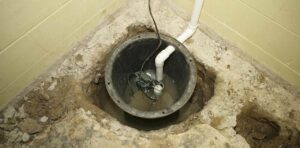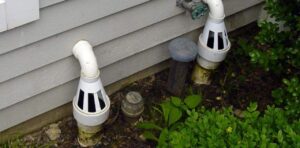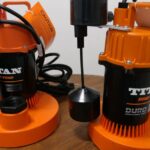Sump pumps, often tucked away in basements or crawl spaces, are essential for preventing water damage in our homes. A common concern among homeowners is the mysterious odor emanating from these devices. Understanding these odors is vital in maintaining a healthy and efficient sump pump system.
Have you ever entered your basement and been greeted by a musty, unpleasant smell? That’s the moment when you wonder, why does my sump pump smell, and how can I fix it? The answer to this question could save you from potential water damage and costly repairs.
Stagnant water, mold, mildew, or bacterial growth within the sump pit are common culprits. In some cases, the smell may indicate a malfunction in the pump system, requiring immediate attention. This article will explore the reasons behind sump pump odors, discuss prevention methods, and guide you on how to tackle the issue.
Understanding Sump Pump Odors
Sump pump odors can be off-putting, and they often indicate an underlying issue. Let’s delve into the reasons behind these unpleasant smells.
| Cause of Sump Pump Smell | Solution |
| Stagnant Water in Sump Pit | Maintain proper water levels; consider a pit liner. |
| Mold and Mildew Growth | Clean the sump pit, ensure ventilation, and use bleach. |
| Bacterial Growth | Remove debris, consider a biocide tablet. |
| Overheating | Ensure appropriate pump size; consult professionals. |
| Oil Leaks | Turn off the pump, repair or replace damaged parts. |
| Clogged or Worn Impeller | Regularly clean and replace the impeller as needed. |
This table provides a concise overview of common causes and their respective solutions regarding sump pump odors.
Stagnant Water in the Sump Pit
- The Issue: One common cause of sump pump odors is stagnant water in the sump pit. When water sits still for extended periods, it can become a breeding ground for bacteria and algae, leading to a foul smell.
- The Solution: Regularly inspect your sump pit and ensure that the water level is being maintained at the necessary levels. Consider installing a sump pit liner to prevent water from sitting too long.
Mold and Mildew Growth
- The Issue: Sump pump pits are typically dark and damp environments, making them prone to mold and mildew growth. These fungi can release musty odors that permeate your home.
- The Solution: Clean your sump pit and the pump itself periodically. You can use a mixture of water and bleach to remove mold and mildew. Make sure the area is well-ventilated to discourage their return.
Bacterial Growth
- The Issue: Bacteria can thrive in the water inside the sump pit, and they produce unpleasant odors. This can occur when organic materials, like leaves or debris, find their way into the pit.
- The Solution: To prevent bacterial growth, regularly remove debris from the sump pit. Consider adding a biocide tablet to the pit, specifically designed to control bacterial growth and odors.
Sump Pump Mechanical Issues
Sometimes, sump pump odors are not due to the water or the pit but instead stem from mechanical problems.
Overheating
- The Issue: Sump pumps can overheat if they’re working excessively, which can lead to a burning smell. This might occur if your pump is too small for the amount of water it needs to handle.
- The Solution: Ensure that your sump pump is appropriately sized for your needs. If it’s frequently overheating, consult with a professional to evaluate and possibly replace the pump.
Oil Leaks
- The Issue: A leaking sump pump can release an oily smell. Oil leaks typically occur when the pump’s seals or gaskets deteriorate.
- The Solution: If you suspect an oil leak, turn off the pump immediately and contact a professional for repairs. Regular maintenance can help prevent this issue.
Clogged or Worn Impeller

- The Issue: The impeller in your sump pump can become clogged with debris or wear out, leading to a burning smell.
- The Solution: Regularly clean the impeller and replace it if necessary. A well-maintained impeller will not only prevent odors but also ensure your sump pump operates at its best.
Preventing Sump Pump Odors
Now that you understand why your sump pump might be emitting odors, let’s explore preventive measures to keep your sump pump smelling fresh and operating optimally.
Regular Maintenance
- Check the Float Switch: Ensure that the float switch operates correctly. This component triggers the sump pump when the water level rises.
- Inspect the Discharge Line: Regularly examine the discharge line to prevent clogs and ensure water flows freely away from your home.
- Clean the Sump Pit: Periodically remove debris and clean the sump pit to prevent bacterial growth, mold, and mildew.
- Test the Backup Battery: If your sump pump has a backup battery, test it regularly to ensure it will function during power outages.
Proper Sump Pit Cover
- Airtight Cover: Use an airtight cover for your sump pit to prevent odors from escaping into your living space.
- Ventilation: Ensure that your sump pit area is well-ventilated to reduce humidity and discourage mold and mildew growth.
Regular Inspections
- Professional Inspections: Schedule annual inspections by a qualified technician to identify and address potential issues before they become major problems.
- DIY Inspections: In addition to professional inspections, check your sump pump periodically for any signs of wear or malfunction.
Solving Sump Pump Smells Common Causes and Cures
Stagnant Water
- Identify stagnant water as a common cause of sump pump odors.
- Maintain proper water levels in the sump pit.
- Consider using a pit liner to prevent water from stagnating.
Mold and Mildew Growth
- Understand how mold and mildew can contribute to odors.
- Regularly clean the sump pit to remove mold and mildew.
- Ensure good ventilation in the sump pit area.
Bacterial Growth
- Recognize how bacteria can thrive in the sump pit.
- Remove debris from the sump pit regularly.
- Consider using a biocide tablet to control bacterial growth.
Banish That Musty Odour Sump Pump Maintenance Tips
Regular Inspections
- Emphasize the importance of regular sump pump maintenance.
- Check the float switch to ensure it operates correctly.
- Inspect and clean the sump pit periodically.
Impeller Maintenance
- Explain the significance of maintaining the impeller.
- Regularly clean the impeller to prevent clogs.
- Replace the impeller when worn out.
Preventing Overheating
- Address the issue of sump pump overheating.
- Ensure the sump pump is appropriately sized for your needs.
- If you find the need to reset a sump pump frequently, it’s advisable to seek assistance from a professional.
Preventing Sewer-like Smells in Your Sump Pump Pit
Sewer Gasses
- Discuss the issue of sewer-like smells entering the sump pump pit.
- Check for damaged or improperly sealed sump pit covers.
- Replace or seal covers to prevent sewer gasses from entering.
Fresh and Dry How to Keep Your Sump Pump Smelling Clean
Airtight Covers
- Highlight the benefits of airtight sump pit covers.
- Use airtight covers to prevent odors from escaping into the living space.
Ventilation
- Explain the importance of proper ventilation in the sump pit area.
- Ensure good airflow to reduce humidity and discourage mold and mildew growth.
Regular Professional Inspections
- Stress the significance of professional inspections.
- Schedule annual inspections by qualified technicians to identify and address issues.
Battling Basement Odours The Sump Pump Odor Dilemma
- Understanding the Dilemma: Introduce the challenge of managing sump pump odors.
- Comprehensive Solutions: Summarize the various solutions discussed in the article.
- Final Thoughts: Provide a brief conclusion or summary of the article’s key takeaways.
These headings and bullet points should help structure your content effectively and enhance readability for your readers.
FAQ’s
Why does my sump pump pit smell like sewer?
A sewer-like smell in your sump pump pit may indicate a problem with sewer gasses entering the pit through a damaged or improperly sealed cover.
How do I keep my sump pump water clean?
To keep sump pump water clean, maintain regular pit cleaning, and prevent debris from entering the pit.
How do I get rid of the smell in my sump pump?
Eliminate sump pump odors by cleaning the pit, ensuring proper ventilation, and using biocide tablets as needed.
Conclusion
Understanding the source of sump pump odors is essential for maintaining a healthy and efficient system. By addressing the issues at the root, you can enjoy a sump pump that not only keeps your basement dry but also fresh and odor-free.
Regular maintenance, proper sizing, and vigilant inspections are your best tools in preventing those unwelcome sump pump smells. So, the next time you ask, why does my sump pump smell? you’ll have the knowledge and tools to find the answer and keep your home protected and pleasant.










